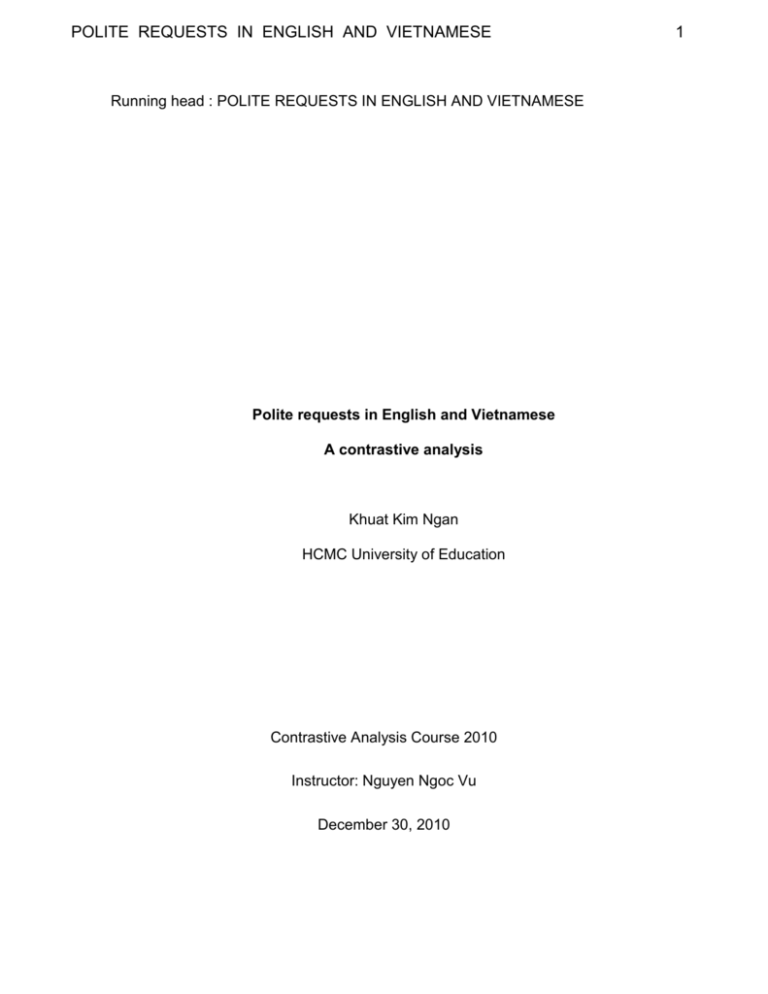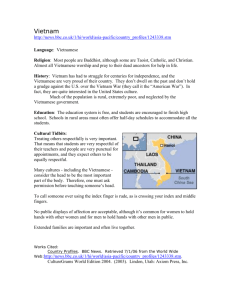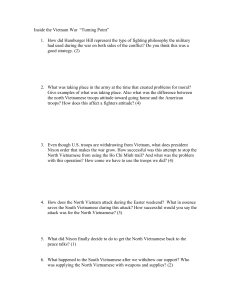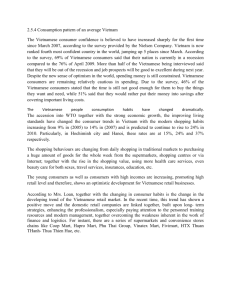IV. The Contrastive analysis of requests in English and
advertisement

POLITE REQUESTS IN ENGLISH AND VIETNAMESE Running head : POLITE REQUESTS IN ENGLISH AND VIETNAMESE Polite requests in English and Vietnamese A contrastive analysis Khuat Kim Ngan HCMC University of Education Contrastive Analysis Course 2010 Instructor: Nguyen Ngoc Vu December 30, 2010 1 POLITE REQUESTS IN ENGLISH AND VIETNAMESE 2 Polite requests in English and Vietnamese A contrastive analysis I. Abstract Language is one of the dispensable components in our life, like air, food and water. Because it serves many functions in conversational situations, we use it everyday to meet our demands in such aspects as greeting, giving opinion, refusing, offering, making requests…etc, which are all considered as food to help you to survive and grow perfectly in life. Without all or just one of them, it would be difficult for you to control your life. In this contrastive analysis, I would like to focus on the function of making requests in English and Vietnamese. I hope that it will be helpful for you to figure out the differences as well as the similarities of this issue. POLITE REQUESTS IN ENGLISH AND VIETNAMESE II. 3 What is speech act? The theory of speech act is developed by two philosopher of language, John Austin and John Searle in the 1950s and 60s. According to their research, language is not just used to mention the fact i.e what is right and what is wrong. More importantly, people use language to serve a particular function, or in other word, when we speak we “perform physical acts”. For example, language helps us to convey a large number of conversational intentions such as to give orders, to make requests, to give warnings…etc. There are two types of speech acts which are classified by Searle (Searle 1969, 1975): indirect and direct. + Indirect speech act refers to the illocutionary meaning i.e the meaning that goes beyond what you have said + Direct speech act conveys the locutionary meaning or the factual meaning III. An overview of speech act of request 1. Definition A request is a speech act which its function is to ask someone to do/not do something or to express the need or desire for something. In everyday conversation, people normally use language in order to achieve certain communicative intentions. Therefore, requests are widely used by people all over the world for various reasons such as asking for help, seeking support, obtaining information…etc. Generally, a speech act of request is a essential part in our life because it is a necessary need that helps us to survive. Normally, one cannot be successful without the help of other people. Without requests, life would be more and more difficult and challenging because people would have to do everything on their own. POLITE REQUESTS IN ENGLISH AND VIETNAMESE 4 2. Classification Making requests is a speech act. In English, the speech act of making request is divided into two types: direct requests and indirect requests. The latter is divided into two smaller parts: conventionally indirect requests and non-conventionally indirect requests. This table below will help you to figure out exactly and in a detailed way this classification. Direct requests Imperatives Tell me the way to X! Performatives Unhedged I’m asking you to tell me the way to X! Hedged I want to ask you the way to X! Want statements I wish you’d tell me the way to X! Locution derivable Where is X? conventionally Availability Have you got time to tell me the way to X? indirect Prediction Is there any chance to tell me the way to X? requests Permission Could I ask you about the way to X? Willingness Would you mind telling me the way to X? Ability Could you tell me the way to X? Hints I have to meet someone in X. nonconventionally indirect requests POLITE REQUESTS IN ENGLISH AND VIETNAMESE 5 3. Illustration This table will show you how making requests work in English. Normally, the utterances are different but they all convey the same meaning. In English, people often produce indirect requests. Sentence IV. Speech act Direct or indirect The floor is very dirty Request Indirect Could you clean the floor? Request Indirect Would you mind cleaning the floor? Request Indirect Are you in charge of the floor? Request Indirect Please clean the floor! Request Direct I request you to clean the floor. Request Direct The Contrastive analysis of requests in English and Vietnamese 1. The similarities It is not difficult to realize the similarities between making requests in English and Vietnamese. First of all, I would like to mention the similarities in term of sentence structure. In both English and Vietnamese, utterances are divided into three types: interrogative, which is mostly used; imperative and declarative. Normally, people can apply these types for one conversational situation. For example, when someone would like the other to do something such as to open the window, he/she can use language in different ways to convey the conversational intentions. These different ways can be: - Could you please open the window? (Bạn mở cửa sổ dùm mình được không?) Interrogative POLITE REQUESTS IN ENGLISH AND VIETNAMESE - Open the window, please. (bạn làm ơn mở cái cửa sổ dùm mình.) Imperative - It’s too hot here! (Ở đây trời nóng quá!) Declarative 6 2. The differences Mentioning the differences, I would like to talk about the classification of speech act of request in these two languages, English and Vietnamese. The speech act of request in Vietnamese is a very broad and general term. In comparison with that in English, it includes others speech acts such as giving advice, giving invitation…etc. To make it easy for you to understand, I will show you how Vietnamese speech act of request is classified. A. COMPETITIVE REQUESTS a) Ordering Ex: - Cấm hút thuốc ở khu vực này. - Con không được làm phiền mẹ khi mẹ đang làm việc b) Making suggestions, asking permission First of all, I would like to give to the definition. The speech act of making suggestion or asking for permission is applied when you want others to do or accept things mentioned in the utterances. Also, it expresses the desire and the hope that these things will be done. Ex: Making suggestion: - Mình đi chung xe với bạn nhé! - Ngày mai mình đi coi phim được không? Ex: Asking for permission: - Xin phép hai bác, cho cháu chở Lan đi chơi tối nay. - Ngày mai con đi Vũng Tàu chơi với bạn được không ạ? POLITE REQUESTS IN ENGLISH AND VIETNAMESE 7 c) Making request In daily life, people normally apply the speech act of request when they would like others to do something for them or assist them to do something. Ex: - Bạn cho mình mượn cây bút chì được không? - Anh ơi, anh mở dùm em cái cửa nha. B. FRIENDLY REQUESTS a) Giving advice Ex: - Cậu nên học hành chăm chỉ lại đi, sắp thi rồi đó. - Nếu mình là bạn, mình sẽ không đi đến đó. b) Expressing encouragement Ex: - Đừng lo, rồi mọi chuyện sẽ ổn thôi. - Đừng buồn nữa, con đã cố gắng hết sức rồi mà. c) Making invitation Ex: - Tối mai cậu rãnh không, mình đi ăn hủ tiếu nha, mình biết quán này ngon lắm. - Mai nhà tớ tổ chức ăn đầy tháng đứa em út, các bạn nhớ đến đông đủ nha. C. POLITE REQUESTS According to many researchers, the level of politeness depends on the the way people use language for communication in daily life. In each situation, there are many different ways to communicate in general and to make request in particular. Specifically, according to P. Brown and S.Levinson, the more indirect an utterance is, the more polite it will be. These two POLITE REQUESTS IN ENGLISH AND VIETNAMESE 8 researchers also consider that because making request perform greatly a face-threatening act, people always care about how to do it in the most polite way in order to save others’ face. Therefore, when taking part in communication in both English and Vietnamese, we need to take into consideration these things: - How difficult, unpleasant or urgent the task is - Who you are and who you are talking to – the role you are playing and your relationship. (Functions of English – Leo Jones) After all, in this paper, I would like to emphasize this part, polite request. The first thing that I would like to give you a contrastive analysis is how an utterance is made to be a polite request. Certainly, this is a very complicated problem because when analyzing language, we have to pay attention to two major forms of language: verbal language and nonverbal one related to gestures. However, in this analysis, we just focus on the differences of verbal language in English and Vietnamese polite request. There are some factors that make an utterance seem to be polite in Vietnamese request. Some words which has a strong effect of asking for help or assistance on the listener such as “làm ơn, nhờ, xin, lạy, giùm, giúp, thương, trăm sự nhờ, …” Ex: - Con lạy cụ, cụ làm ơn cho cô ấy ra cho con hỏi một tí. (Nam Cao) - Lạy ông bà xét lại, chỉ có người trên nhà, chứ thực chúng con không biết đấy là đâu. (Nguyễn Công Hoan) Through these examples, you can realizes the position of the two participants in the conversation. Both examples express unequal relationship. Normally, the higher the listener’s position, the more polite the speaker will be. POLITE REQUESTS IN ENGLISH AND VIETNAMESE 9 Another factor is based on the system of personal pronouns. People tend to use plural personal pronouns to make requests. For instance, they often use “chúng mình, chúng ta, chúng tôi, bọn mình..” instead of “tôi, mình..”. when we use “chúng tôi”, the request will be more objective because it is not just one person but a group to make a request. If we utter “chúng ta, chúng mình..”, both the speaker and the listener try to do things mentioned in the utterance. In both cases, the face-threatening act is mitigated. Ex: - Chúng tôi muốn nhờ anh một việc nhưng không biết anh có rảnh không. - Sắp đến tết rồi, chúng ta cùng dọn dẹp nhà cửa đi. However, the politeness also depends on the formality of the situation and the relationship of the participants. Ex: - Ngày mai tụi bay nhớ chờ tao nha. In this example, the pronouns “tụi bay” and “tao” make the request less polite and often used in informal situations. In English, as we know, we have just seven personal pronouns. Hence, the use of personal pronouns in English is not as important as the analysis of the context of the conversation, i.e where and when the conversation takes place, who take part in the conversation. Before leading you to a deep analysis of English request, I would like to show some example in which the politeness is arranged in ascending order. POLITE REQUESTS IN ENGLISH AND VIETNAMESE 10 Hey, I need a pencil to draw a picture. Oh, dear, I haven’t got any pencil to draw a picture. I don’t seem to have any pencil with me today. You haven’t got a pencil, have you? Have you got a pencil, by any chance? You couldn’t lend me a pencil, could you? Do you think you could lend me a pencil? I wonder if you could lend me a pencil. Would you mind lending me a pencil? If you could lend me a pencil, I’d be very grateful. Could you possibly lend me your car? Do you think you could possibly lend me your car? I wonder if you could possibly lend me your car. I hope you don’t mind my asking, but I wonder if t might be at all possible for you to lend me your car? According to this classification, you can easily figure out that to make it more polite, people tend to use interrogative form rather than declarative form. Like Vietnamese, English people also insert some common word into their utterances to make it more polite such as “please, hope, possible, possibly”. These words contribute to the speaker’s politeness and also play an important role in showing that you respect the person whom you are talking to. One more thing about the differences between English and Vietnamese polite request I would like to clarify is the way language works in each country. I will give you an example to help you understand what I mean clearly. POLITE REQUESTS IN ENGLISH AND VIETNAMESE English Could you possibly lend me your car? 11 Vietnamese Bạn có thể cho mình mượn xe được không? Bạn cho mình mượn xe nha. Bạn cho mình mượn xe nhé. Anh cho em mượn xe được không? Anh cho em mượn xe nha. Mày cho tao mượn xe nha. Con cho ba mượn xe nhé. As you can see from the table, just one English utterance can be translated into many Vietnamese ones depending on the context. Obviously, it is because of the difference in the personal pronouns of these two countries. The personal pronoun “I” can be equivalent to “tao, ba, em, mình..” and the personal pronoun “you” are equal to “mày, con, anh, bạn…”. this difference make us easily feel the politeness of Vietnamese request rather than English request because we can realize the relationship of the participants. For example,”mày-tao” indicates the friendship, “ba-con” express the relationship in family,etc. When we read an utterance conveying the requesting intention in English, we can just realize its politeness through the sentence structure and some words such as “please, hope, possible, possibly” as I have said earlier, but we cannot know whether they are friends, boss and staff or father and child. In term of grammar use, most of polite request in English and Vietnamese are in present time. In English and Vietnamese, there are many way of making requests but these following grammar structures is mostly used. POLITE REQUESTS IN ENGLISH AND VIETNAMESE English Vietnamese - Can you….? - - Bạn có thể ….? - - Do you think you could….? - - Bạn ……….nha. - - I wonder if…. - - Bạn giúp mình…….nhe. - - I hope… - - Gíup em làm cái này với. - 12 VII. Teaching application A deep understanding will help you achieve your goal effectively in many aspects, especially in learning a foreign language. Therefore, with an insight look into the speech act of request in English and Vietnamese, I would like to draw out some implication in teaching and learning for those who are learning these two languages: English people tend to be polite in formal situation, so teachers’ role is to provide them with some devices to make their utterances polite when making requests. For example, Vietnamese students are used to translating word for word. When they want to express their request “Bạn có thể mở cửa dùm mình được không?”, they often translate “Can you open the door?”. In this situation, the teacher needs to give them some word showing politeness to add to their utterances such as “please, possibly…” or use other structures “Could you…?, Do you think you could…?” For those who learn Vietnamese, it is necessary to learn personal pronouns. Because there is a variety of personal pronouns in Vietnamese such as “cô, chú, dì, cậu..”, people who want to acqiure Vietnamese should be helped to be flexible to deal with language effectively in each situation. POLITE REQUESTS IN ENGLISH AND VIETNAMESE 13 VI. Summary and conclusion So far I have already given you a brief contrastive analysis of polite requests in English and Vietnamese. Each country has a typically different culture, which results in the differences in the way people express their politeness when making requests. As I have mentioned in the first part, language is considered as “food”- a necessary factor in our life, so we need to learn how to handle with it as effectively as we can. In other words, if you acquire how polite requests work in each country, you can use it in an appropriate way so that your desire of requesting can be fulfilled. In general, this paper is useful for those who have much exposure to English such as students and teachers because the goal of their work is to acquire and to use English, not just learn to “translate” a language to another. Finally, I hope that this paper will provide you – irrespective of teachers or learners – with useful information which assist you effectively in your work. POLITE REQUESTS IN ENGLISH AND VIETNAMESE 14 References Paltridge, B. (1999). Making sense of discourse analysis. University of South Australia. Mouton de Gruyter (2008). Developing contrastive pragmatics : interlanguage and crosscultural perspectives. Ed. Martin Pütz, JoAnne Neff-van Aertselaer. Berlin, New york. Lê, T. K. Đ. (2006). Lịch sự trong hành động cầu khiến Tiếng Việt: Chuyên ngành Ngôn ngữ học. Hochiminh: Ho Chi Minh City University of Pedagogy Press. Jones, L. (1981). Functions of English. Cambridge University Press. Rue, Y. J., Zhang, G. Q. (2008). Request strategies: A comparative study in Mandarin Chinese and Korean. John Benjamins Publishing Company.
![vietnam[1].](http://s2.studylib.net/store/data/005329784_1-42b2e9fc4f7c73463c31fd4de82c4fa3-300x300.png)



